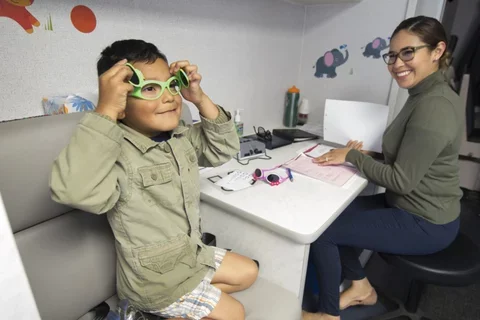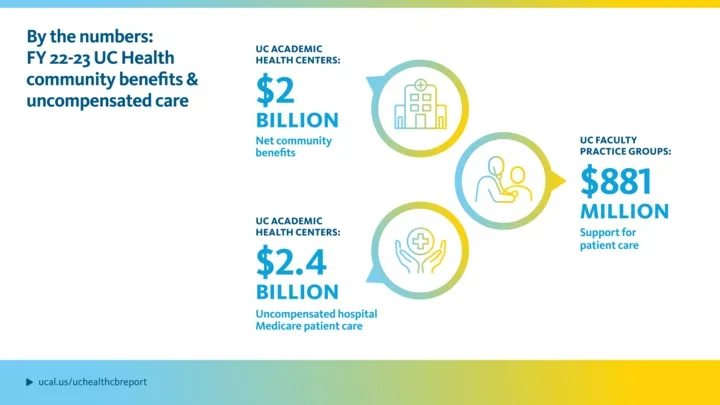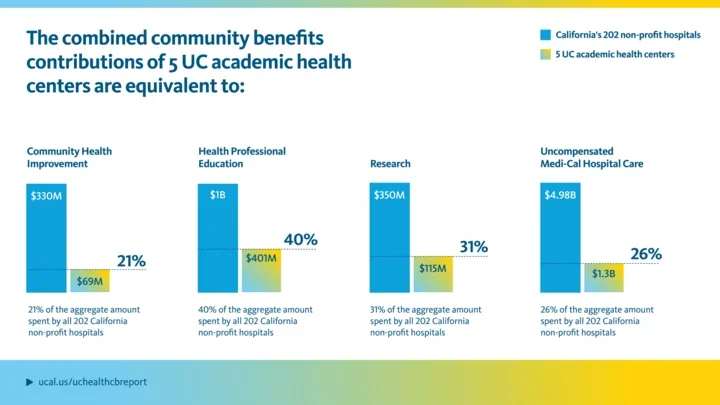UC's academic health system is investing in addressing the health needs of California's communities

The University of California Health has released its FY 2022-2023 community benefits report .
The report details the system's investments in addressing local health care needs. The community programs supported are offered both inside and outside of UC facilities, and many are in partnership with state and local organizations.
UC's academic health centers invested $2 billion in net community benefits, including $69 million for community health improvement services. Additionally, UC academic health centers provided $1.3 billion in uncompensated hospital care for Medi-Cal enrollees and $2.4 billion for Medicare enrollees. UC faculty practice groups also supported patient care by delivering $881 million in uncompensated professional service fees for Medi-Cal and Medicare enrollees as well as direct patient financial assistance.

UC Health locations are addressing community health needs through four key approaches
All UC academic health centers work to increase access to coordinated care and create programs that address whole-person health care and social needs. Many of these efforts are in collaboration with regional partners, such as county agencies, Federally Qualified Health Centers (FQHCs) and community-based organizations.
Guided by regional Community Health Needs Assessments (CHNA), UC health locations invest in programs that:
- Support California's safety-net health care system by providing high-quality primary and specialty care, for example:
- UCI Health's FQHC offers care for all
- UCLA Health delivers community care in partnership with Care Harbor and Los Angeles Dodger Foundation
- The UCLA Health Homeless Healthcare Collaborative delivers customized street medicine care that makes a difference through
- UC San Diego Health provides trauma care for US-Mexico border wall falls
- Help improve health equity and address barriers to care, for example:
- All academic health centers within UC Health engage in the Anchor Institution Mission
- UC Riverside School of Medicine has a community college-UC medical school primary care pathway program
- The UCSF Health EMBRACE clinical program provides transformative and holistic wellness for Black birthing families
- Connect patients to local follow-up services through community partnerships, for example:
- UC Health connects patients to community services through FindHelp and 211
- UC Davis Health provides daily food service for people experiencing homelessness after hospital discharge
- UC Riverside School of Medicine is bringing services to the community through the Unsheltered Outreach Program
- UC San Diego Health offers transportation, food and services for patients in-need through community partnerships
- Expand access to care for children and families, for example:
- UC Davis Health creates free youth heart screening opportunities through Project ADAM
- UCI Health provides mobile eye care for children
- UCSF Health offers assistance for youth victims of violence
Descriptions of these programs are available in the report .
Community benefits are programs or activities that provide treatment or promote health and healing in response to identified community needs.
"One of the most impressive aspects of UC's health locations is the magnitude of their contributions to their communities, both in the direct investments they make to support community health needs, and their pride in being one of the largest safety net providers for the state of California . I'm proud of the contributions our academic health centers are making, and we will continue to look for new partnerships that will expand our reach into our communities as we move forward." – David Rubin, MD, MSCE, executive vice president of UC Health
UC Health is part of California's safety net health care system
Together, the five UC academic health centers that own and operate hospitals made community benefits investments equal to:
- 21 percent of the aggregate amount spent by all of California's 202 non-profit hospitals in community health improvement
- 40 percent of the aggregate amount spent by all of California's 202 non-profit hospitals in health professional education
- 31 percent of the aggregate amount spent by all of California's 202 non-profit hospitals in research
- 26 percent of the aggregate amount spent by all of California's 202 non-profit hospitals in Medi-Cal uncompensated care

UC Health's $2 billion in community benefit spending and uncompensated hospital care for Medi-Cal enrollees is equal to 9.9 percent of total operating expenses systemwide, exceeding the level of most other large (230+ beds) tax-exempt, nonprofit hospital system in California.
About community benefits reporting
The annual UC Health report is published to provide transparency regarding community benefits investment and uncompensated care. As governmental organizations, UC's academic health centers are not required to file reports related to community benefits annually with the IRS; However, this report follows guidelines published by the Internal Revenue Service for filing of Form 990, Schedule H by tax-exempt, non-profit hospitals. The standardized reporting enables transparency about the community benefits being delivered and facilitates comparisons to benchmarks for other tax-exempt, non-profit hospitals.
For more details about UC's investments in the health of California's communities, read the FY 2022-2023 UC Health Community Benefits Report.
About University of California Health
As a safety-net provider of primary and specialty care services, UC Health is committed to delivering and expanding high-quality, coordinated health care and supporting public health. With six academic health centers, 17 acute care hospitals, faculty practice groups at six schools of medicine, many outpatient facilities and affiliate partnerships, UC Health locations work to align investments in community programs with the needs of all residents, as informed by local and state partners.



